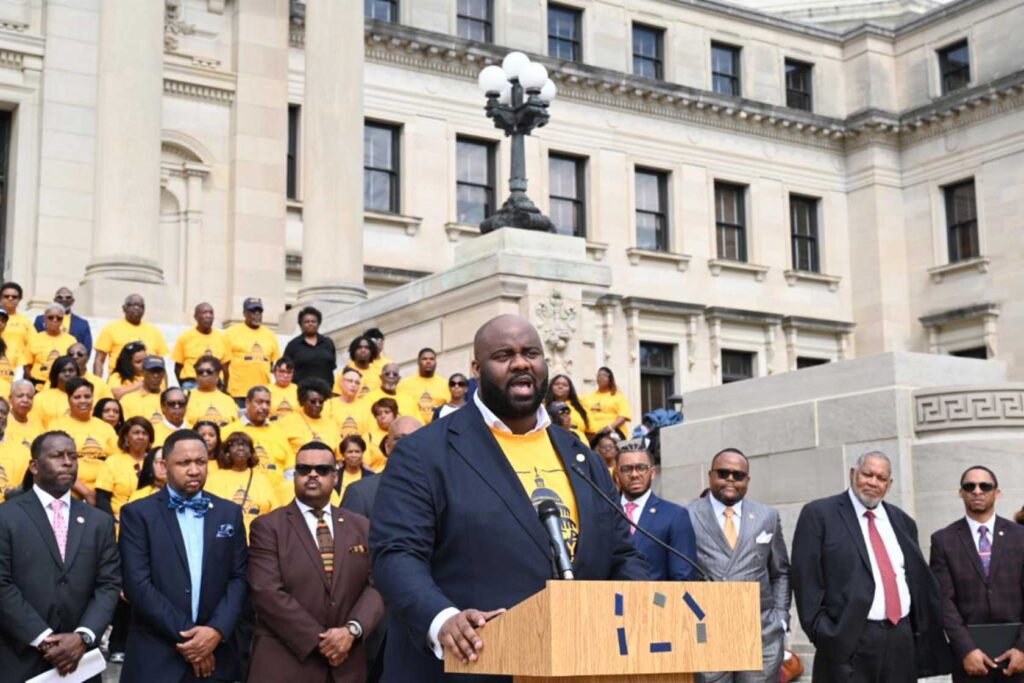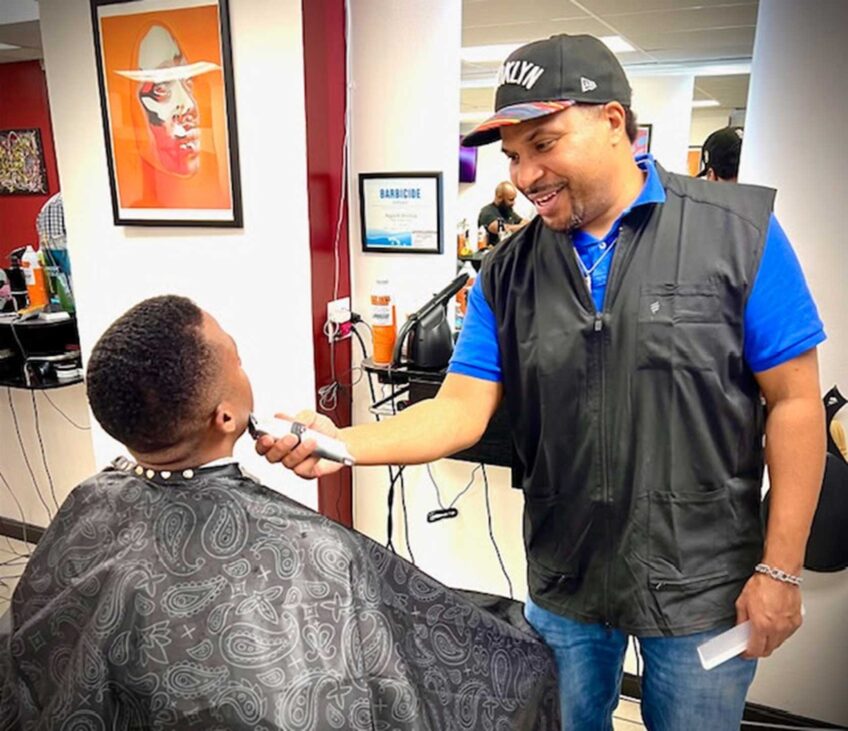
The sentencing of six Mississippi police officers for the torture and beating of two Black men in Rankin County was very welcome to local Black communities but is just the beginning.
The police officers, who were sentenced last month with a combined total of 132 years in federal prison, still face sentencing in their state court trial and members of the local NAACP are pushing for the removal of Rankin County Sheriff Bryan Bailey.
“As long as Bryan Bailey is still the sheriff, we don’t expect the culture to change,” said Angela English, president of the Rankin County NAACP.
The six officers, part of a self-styled “Goon Squad,” faced dozens of charges following an attack during a no-warrant home raid in January 2023 in which they handcuffed, beat, tortured and sexually assaulted Eddie Parker and Michael Corey Jenkins in response to a neighbor’s complaint that the two Black men were staying in a home with a white woman.

Michael Corey Jenkins, one of the two men beaten and tortured by six Mississippi police officers. PHOTO: ERIC J. SHELTON/MISSISSIPPI TODAY
Charles Taylor, executive director of the NAACP Mississippi State Conference, said he’s glad to see some form of justice come from the sentencing, but is concerned that the actions stem from a deeper culture in the sheriff’s department.
“Those kinds of practices have to be eradicated, especially as they relate to folks who are supposed to help to support and defend communities,” he said.
Both Parker and Jenkins, along with English and members of the local NAACP, have called for Bailey’s resignation from the sheriff’s office, and Parker and Jenkins have filed a $400 million lawsuit against the department. Taylor called the actions of the Goon Squad “just a symptom” of a corrupt sheriff’s department.
Bailey has said he will not resign.
Following guilty pleas from the six officers in August, Bailey denounced the actions of the officers but said he had no knowledge of the actions of the so-called Goon Squad.
“The people of Rankin County elected me to do a good job during good times and bad times,” Bailey then said in a press conference. “I’m going to stay here. I’m not going to resign. I’m going to fix these problems and try to leave this [department] in better shape than I found it.”
The local NAACP branch is pursuing other means of removing Bailey from his office, which he was reelected to last year.
Under Mississippi law, there is no way for voters to recall an elected official through a snap election, but a petition signed by at least 30% of registered voters in a county can be sent to the governor, who decides whether to remove the county official.
English said she and others are waiting for an updated number of how many voters are in Rankin County, as counties across the state have purged voters. The effort has also been complicated by what she said is longstanding abuse that has scared people into not signing the petition.
“Even though we run into obstacles, we are not giving up,” English said. “We will have this petition.”
The fervor around the Goon Squad has brought new stories to the surface, said Taylor. He said he has heard more stories alleging mistreatment by the Rankin County Sheriff’s Department.
English, a Rankin County native, said this is nothing new and the actions of the Goon Squad don’t surprise her, but do disappoint her.
“It was gut wrenching. It was sad,” she said. “It made me angry that even today in 2024 we are still fighting the same kinds of things that were being fought in ’44 and ’54 and ’64.” she said.
The attack was only the latest in a series of issues in the state that often impact Mississippi’s Black communities most strongly.
In recent years, communities in Jackson, Mississippi, have faced contaminated and sometimes shut-off water supplies and political systems that critics say limit representation of Black voters on the courts and in legislative office.
In recent years, the state has rejected Medicaid expansion in a state that has one of the highest rates of uninsured residents nationwide, earning the state a failing score with the national NAACP’s Hands Off Our Healthcare Campaign, which grades states based on efforts to expand Medicaid and to keep recipients from losing coverage through procedural disenrollment.
“We are a state that in many instances is last at some of the good things and first at some of the bad things,” Taylor said.
The state’s NAACP has been focused on expanding ballot access, improving health care, and pushing for the long-rejected Medicaid expansion that the state’s legislature has, in recent weeks, been poised to move forward on.
The state Senate in Mississippi — one of 10 states, mostly in the South, that have not adopted the expansion — passed a proposal to expand the state’s health care system March 28. It came a month after the House passed its own version.
As of 2022, nearly 305,000 people in the state were uninsured, according to data from the Kaiser Family Foundation. The proposal would make an additional 80,000 people eligible for coverage and leave millions of dollars available to expand the program untouched.
After the Senate’s proposal goes back to the House, it must go to the desk of Gov. Tate Reeves, who has been a vocal critic of Medicaid expansion.
Taylor said a lack of expanding coverage kills many Mississippi residents each year.
“When I think about the weaving between the imagery and this gruesomeness of what happened as it relates to the Goon Squad, in many instances we have state leaders with a stroke of a pen cause just as much harm to our state,” he said.





